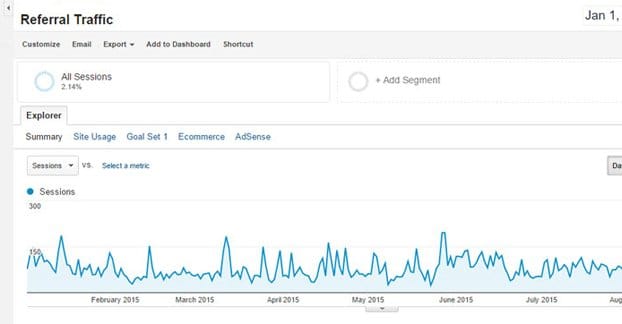One of the main reasons to operate a guest posting campaign is to grow your overall site rank in Google. After all, it’s a form of link building; you’re going out, getting links from high quality content on high quality sites, leading back to your site. The question is, how long does it take to pull in that value?
Timing and Rankings
There are massive number of different factors that go into calculating your search engine ranking. It’s pretty difficult to give one single answer to the question here. What works for me might not work for you, but might work even better for Dave down the street. Variance in industry, in target sites, in content quality, they can all have an impact.
The fact is, a single guest post could improve your rankings almost immediately. Within a day, you could see a spike in traffic, a surge in conversions, an increase in daily readers, an increase in social media followers, and a higher positioning in the search engine ranks.
On the other hand, you might never see an improvement from that post. A day later, a week later, a month later; no movement at all. There are simply too many factors to give you one coherent answer. There’s no one-size-fits-all solution.
Factors Involved in Ranking
There are a lot of elements that go into determining if a guest post is going to help you rank or not. I’ve tried to cover them all, or as much as possible.
Content relevance. If you’re a blog about shoes and you guest post on a fashion blog that focuses on shoes, you’re writing highly relevant content for the target site, with users who will be interested in the content on your site. This is a good thing. If you’re a blog about shoes and you write a guest post for a generalized apparel store, it can still fit, but a sizable section of the audience won’t necessarily be interested in you or your content. It works, and can still be valuable, but it isn’t quite the same level of match. If you’re a blog about shoes and you write a guest post for a blog about external siding, it’s completely irrelevant and valueless.
Irrelevant content is one of those SEO quirks that doesn’t seem obvious at first glance, but makes sense. Sites build audiences based on their content. Publishing content that doesn’t match the audience could expand the audience into a new topic, if it’s close enough, or it could completely drop the ball. It basically just comes down to how webmasters used to use broad ranges of topics to try to build mega-sites – like eHow, BrightHub, or any of the sites that exploited content mills – just to get as much SEO value from as many avenues as possible. It doesn’t work anymore; the few existing mega-sites on that order still have some kind of topic focus.
Newsworthiness. Whether or not your content is newsworthy can have an impact on how well it does for your SEO. A newsworthy piece of content often has a large initial surge of traffic, but dies down rapidly as the value of that piece drops off. This is why I always recommend that you create evergreen content for your guest posts whenever possible.
Evergreen content doesn’t have the same initial appeal, but it’s the kind of thing people keep coming back to later. This is particularly true if you do some large industry study or have some valuable information people can cite from your post. Unfortunately, the best kind of evergreen content – a tutorial – is hard to pitch as a guest post because it doesn’t have the appeal of other kinds of content.
Position of the link. The position of a link on a page is one element of determining how much value passes along that link. Contrary to popular opinion, all links on a page are not created equal.
Links in navigation, in header and footer, and in sidebars are generally not given as much ranking juice. Links in an author bio, likewise, are worse than links in the content itself. On top of that, links higher up in the content are given more value than links lower down.
This is why in general I encourage you to link to your own website in your content once, and once only. Use your author bio links for a link to your homepage and a social profile of choice, but use a deep link in the content to a relevant piece of content on your own site. The idea is that the link provides value, it is not an advertising link, so it’s a lot more likely to make it past the editors who tend to remove promotional links or ask that a revision remove them.
You can put the link near the top, but making it the very first link is kind of transparent. It really depends on the editors of the target site, how likely that link is to make it through the process.
Relative value of the target site. Depending on the quality of the site you’re guest posting on, and the quality of your site, you can see value or you might not.
If a writer for Moz gets a post on Forbes, Moz likely isn’t going to see much value. The reason is that Moz doesn’t have much room for improvement. They’re already in the top few results for pretty much every query that reaches their site. The same goes vice versa; if a Forbes writer writes for Moz and gets a link, Forbes isn’t even going to notice the blip.
If a writer for Moz guest posts on Bob’s SEO Shack website, the SEO value of the link to Moz is going to be negligible. It’s like adding a single drop of water to a waterfall; it’s not noticeable. “Punching down” with guest posting like that, getting links from sites clearly lower value than your own, does have a purpose. However, that purpose is not in direct SEO improvement.
Pretty much the only way a guest post is going to noticeably improve your rankings is if you get it from a high profile site when your site is not high profile. When I guest post for sites like Entrepreneur, I notice an improvement, because Entrepreneur is a big site with a lot of value to funnel through to my site.
Followed or nofollowed links. Probably the number one determining factor of whether or not a guest post is going to improve your search ranking is whether or not the link is followed. The NoFollow flag explicitly prevents PageRank – link juice – from flowing to your site from the linking site. It’s used as a spam control factor, and allows sites to more carefully control who they’re promoting.
This is one of the ways Google has implemented to help minimize guest post spam. When 10,000 people all email you trying to get a guest post just to get a hint of link juice, it’s nice to be able to add a clause about “all guest post links are nofollowed” to prevent the spam.
The end result of all of this is that you’re probably not going to see much shift in your search engine rankings after a single guest post. One post is not going to have a tangible effect in 99% of cases.
The Real Value of Guest Posting
Guest posting does have value for a site, regardless of the above, however. Even if you’re targeting a smaller, less valuable site than your own, you can still benefit from the exchange.
1: You get referral traffic. You don’t get a TON of traffic, but you do get some, and every potential visitor is better than not having that visitor. Some people will argue day and night that the traffic isn’t worth the effort, and I’ll agree with them on the assumption that all you’re after is traffic. If all you want from your guest post is hits, views to your landing pages, you’re not likely to get them.
2: You get high quality backlinks. Yes, sometimes they’re going to be nofollowed, and there’s nothing you can do about that. However, even with nofollowed links, you’re still getting the brand awareness and mentions that come from having an author bio and a namedrop in your text. There’s some evidence to suggest that simply namedropping a brand counts as something similar to a link, in terms of SEO for that site. Implied links can be valuable even if the actual link itself is not mechanically valuable.
Plus, every guest post for a new site is a new domain linking to your site. Having a diverse link profile is one of the best things you can do for your site. It makes you more resilient to negative SEO. It makes the followed links you get more powerful. It gives you a certain benefit of the doubt against potential penalties if Google finds something wrong about your site. Having a broad link profile can be very helpful, even if a lot of those links are nofollowed.
You do, however, need to make sure that your links are coming from quality sources, regardless of the value of the individual link. If the site is low quality or spam-tier garbage, it’s just going to hurt you to get a link from them. At best, the link will be devoid of all value. At worst, it can actively hurt your SEO.
3: You get more brand awareness. This is perhaps one of the biggest benefits of guest posting. Every guest post is another site that has your name, face, and value on it. People who read sites throughout your industry will start to recognize you from site to site. They will realize the posts have value, attach your name/face/brand to them, and begin to ascribe value onto you.
This means when they come to look for something your product solves and find you, they’ll remember you. They might not know where they remember you from, but they remember they associate you with value, and they’ll be more likely to convert.
There are also elements of exposure that can’t be quantified easily. Often, you will see a story about someone who wrote a guest post and it led to a book deal or new partnership. The user who offered that might not have even clicked your link, but they decided they liked your face enough that they’re willing to offer a deal.
You can’t quantify this kind of value because it’s not tangible on your site. It’s also not repeatable. You can’t guest post for Site X and get value, then write another guest post and get the same value again. Or rather, you can, if you consider that value to be the traffic, link, and exposure, rather than the results of the exposure.
Relationships of value can come from guest posting, but they aren’t going to come from every guest post.
4: You can make money. There are a lot of ways you can make money from guest posting. From the purely mechanical aspect, you can make money if you post on sites that pay their guest contributors. However, you can also make money through conversions and new clients. You can get this by offering exclusive – or “exclusive” – coupons or discounts to readers of the guest post. You can also set up other monetization streams more likely to capitalize on traffic from these kinds of posts.
So, as you can see, there’s real value to be had from guest posting, and you can get valuable search engine rank benefit from them. You just can’t rely on that benefit alone, and there’s no way for me to tell you how long it will take you to rank using guest posts. It’s simply too vague, with too many factors.
 ContentPowered.com
ContentPowered.com







